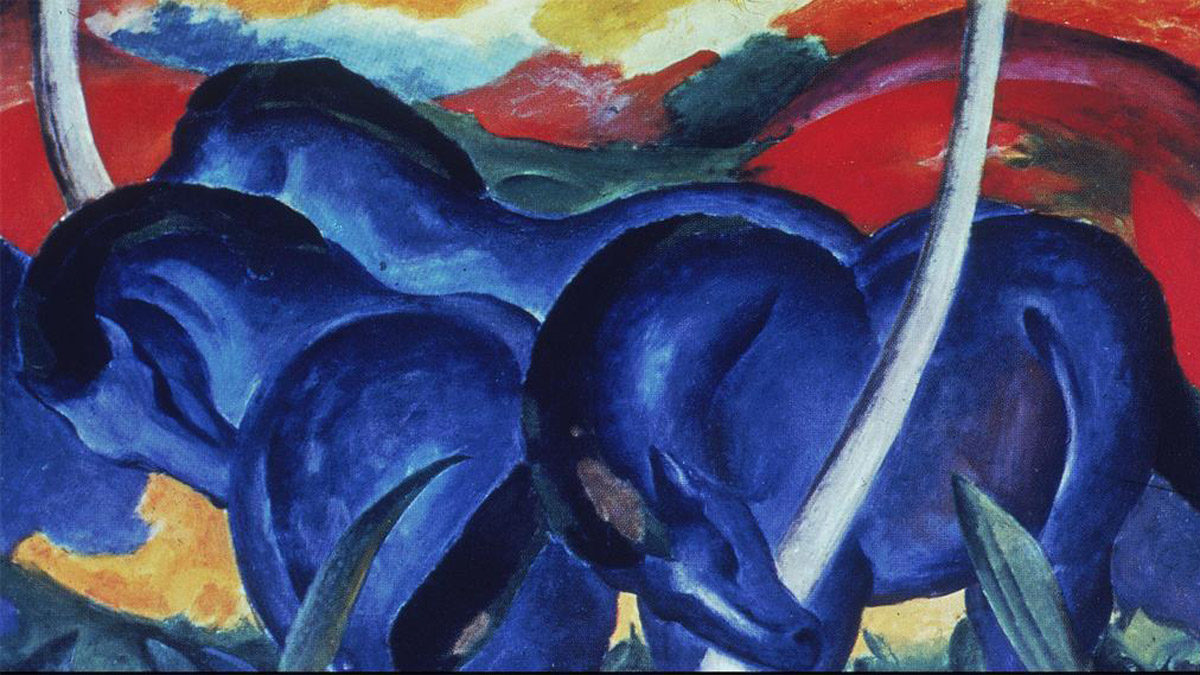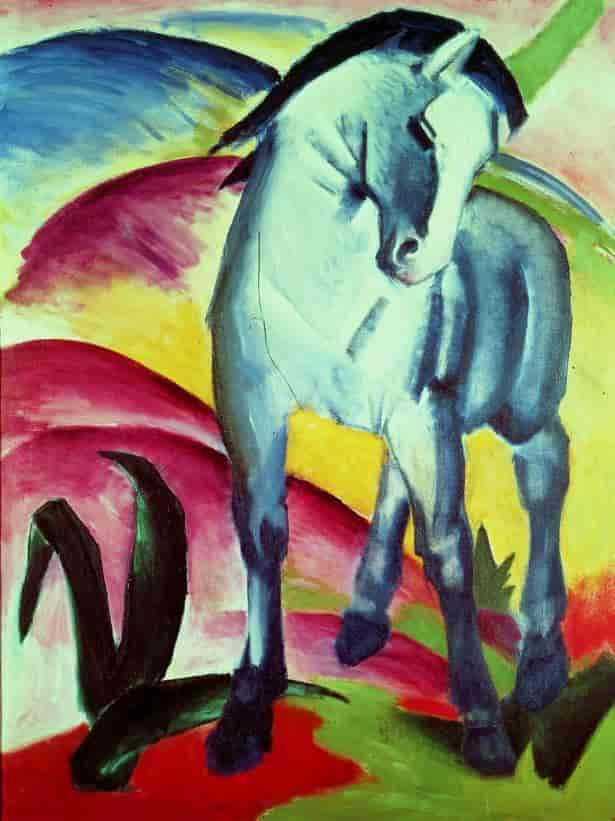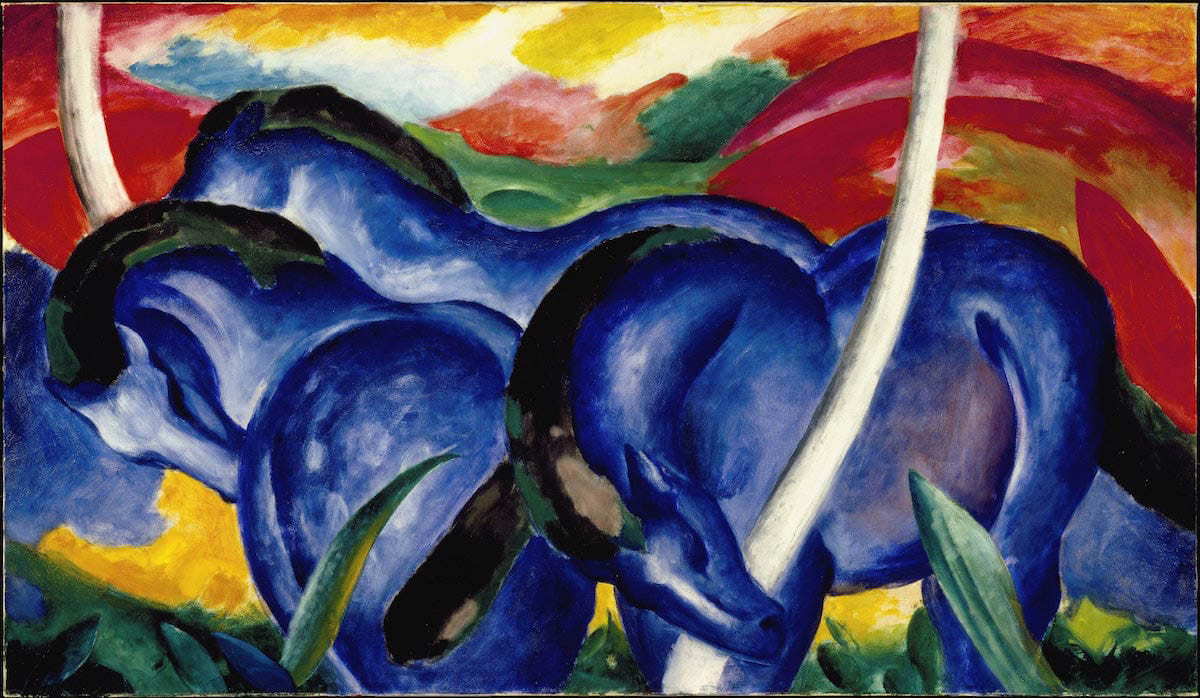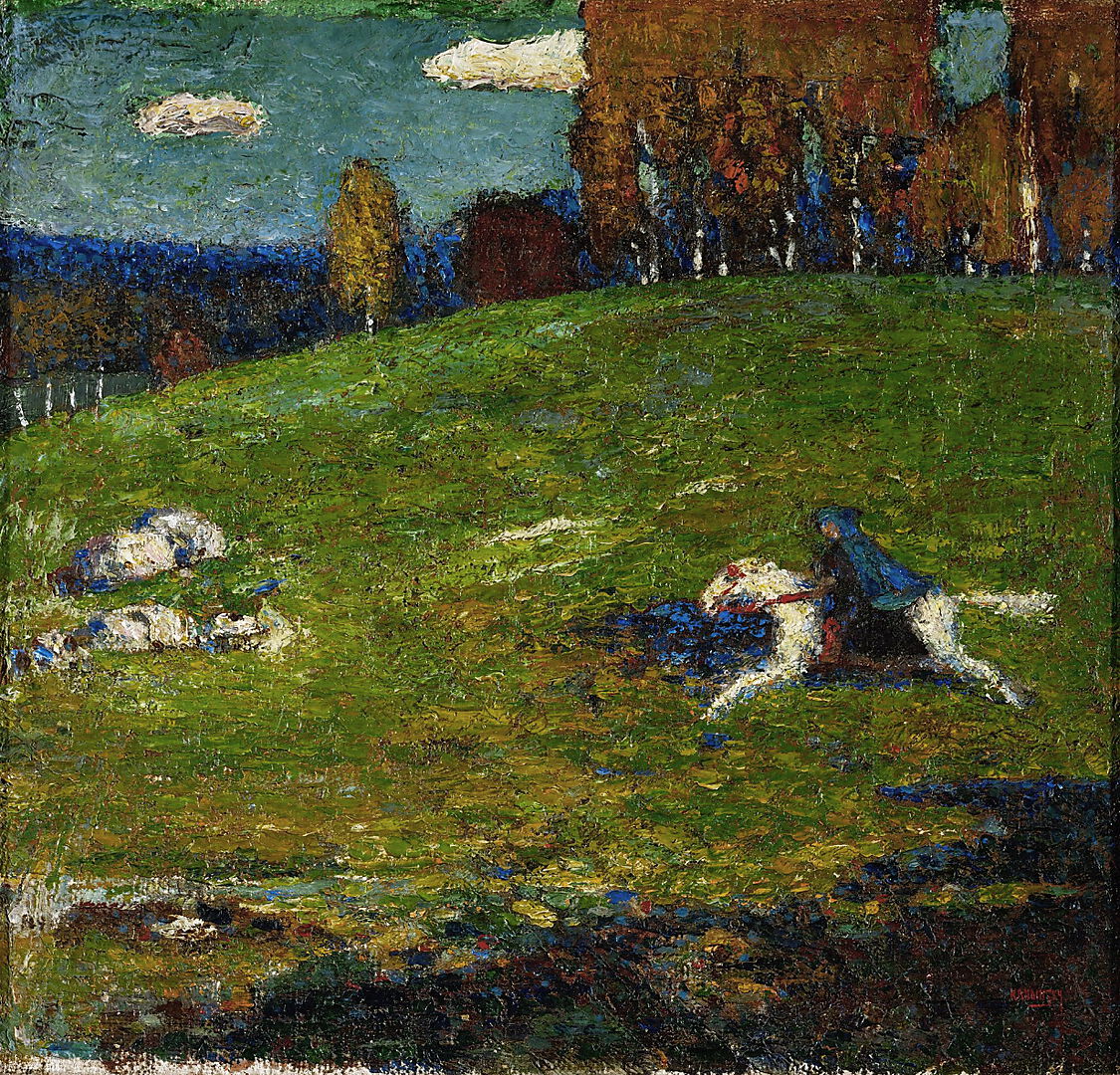
Bild "Blauer Reiter" zu Lenbachhaus in München
Die „Blauen Reiter" fordern eine, vom Gegenstand unabhängige Eigengesetzlichkeit des Bildes. Kandinsky danken wir heute noch für die ihm nachfolgenden abstrakten Kunstströmungen. Andere wichtige Mitglieder „Der Blauen Reiter" sind Gabriele Münter ( 1877 -1962), Paul Klee, August Macke ( 1887 - 1914 ), Alfred Kubin ( 1877 -1959.

Postkartenbuch 'Der Blaue Reiter' Rannenberg & Friends
Self-Portrait. Artist: Marianne von Werefkin A founding member of the Neue Künstvereinigung Munchen (NKvM), Marianne von Werefkin later joined Der Blaue Reiter. Her Self-Portrait of 1910 exemplifies the experimentation of the former group and the semi-abstract manipulation of form and color that would develop in the latter. Her loose, dynamic brushwork shows the early influence of Vincent van.

Kandinsky, Marc & Der Blaue Reiter Artinside
Wassily Kandinsky, cover of Der Blaue Reiter almanac, c. 1912. Der Blaue Reiter (The Blue Rider) is a designation by Wassily Kandinsky and Franz Marc for their exhibition and publication activities, in which both artists acted as sole editors in the almanac of the same name, first published in mid-May 1912. The editorial team organized two exhibitions in Munich in 1911 and 1912 to demonstrate.

The Blue Rider German Art Group
More broadly, Der Blaue Reiter was in the vanguard of the movement towards expressionism and abstraction, leading the way for Gorky, Pollock, Basquiat and their proliferation of artistic heirs today. Wassily Kandinsky, ZUM THEMA JÜNGSTES GERICHT (ON THE THEME OF THE LAST JUDGEMENT), 1913. Lot Sold $22,879,000, November 2018.

Franz Marc Blue Horse, 1911 at Lenbachhaus Art Gallery Munich Germany Franz marc, Blue horse
"Der blaue Reiter" war eine Gruppe von Künstlern, die sich vor 100 Jahren zusammen tat, um gemeinsam ihre Bilder auszustellen und eine Kunstzeitschrift herauszugeben.

Der Blaue Reiter History, Characteristics, Artists Sotheby’s
Bucolic Landscape. Like a fairy tale, a menagerie of animals joins a man and woman in a mountainous landscape. The setting evokes the idyllic artist colony of Sindelsdorf in southern Germany, Heinrich Campendonk's home. The bold colors and geometric shapes reflect the ideas he encountered there. Campendonk and his fellow contributors to the.

Alpenhof Murnau und das Geheimnis der Blauen Reiter Gourmino Express
The 1912 art book Der Blaue Reiter (The Blue Rider) was originally intended to be a yearly "almanac" published by a Munich-based artists' collective of the same name. It is a fascinating document of the early-twentieth century Expressionist art scene, featuring a dozen essays on topics ranging from so-called primitive masks to the stage direction for an experimental "color-tone drama.

Der Blaue Reiter ''Die Kunst gibt nicht das Sichtbare wieder''
Albert Bloch, 1913, The Green Domino, oil on canvas, 130.5 x 85 cm. Bloch was born on August 2, 1882, in St. Louis, Missouri. He studied at the St. Louis School of Fine Arts and the Chicago Academy of Fine Arts. [2] In 1901-03 he produced comic strips and cartoons for the St. Louis Star newspaper. [3] Between 1905 and 1908 he worked as a.

Der Blaue Reiter lex.dk Den Store Danske
Der Blaue Reiter was formed in 1911 in Munich as a loose association of painters led by Vasily Kandinsky and Franz Marc. They shared an interest in abstracted forms and prismatic colors, which, they felt, had spiritual values that could counteract the corruption and materialism of their age. The flattened perspective and reductive forms of.

Gabriele Münter (German; Expressionism, Der Blaue Reiter; 18771962) Sunset over Staffelsee
Anfang des 20. Jahrhunderts formierte sich in Bayern eine innovative Kunstbewegung, die der Moderne in Deutschland den Weg bereiten und später unter dem Namen "Der Blaue Reiter" zu Weltruhm gelangen sollte. Einige junge Künstler, darunter Franz Marc, Wassily Kandinsky, Gabriele Münter, August Macke und Paul Klee, vereinte in jener Zeit der.

Franz Marc Tiere, Traum, Tod "Der blaue Reiter ist gefallen" ntv.de
Der Blaue Reiter. Der Blaue Reiter ist eine Bezeichnung von Wassily Kandinsky und Franz Marc für ihre Ausstellungs- und Publikationstätigkeit, bei der beide Künstler in dem erstmals Mitte Mai 1912 herausgegebenen gleichnamigen Almanach als alleinige Herausgeber fungierten. [1] Das Redaktionsteam organisierte in den Jahren 1911 und 1912 zwei.

„Der blaue Reiter ist gefallen“ Kunst
Der Blaue Reiter, (German: "The Blue Rider") organization of artists based in Germany that contributed greatly to the development of abstract art. Neither a movement nor a school with a definite program, Der Blaue Reiter was a loosely knit organization of artists that organized group shows between 1911 and 1914.

The Brief Yet Extraordinary Art Movement of Der Blaue Reiter Group
Frühe Bilder Akkordeon ein- oder ausklappen. Nach einem Studium der Rechte und Nationalökonomie entschloss sich Wassily Kandinsky 1896, im Alter von 30 Jahren, in München Malerei zu studieren.. 100 und 2 Jahre Blauer Reiter zum Jubiläum. 19. Dezember 2013. zum Jubiläum. Mehr als 100 Jahre ist es her, seit die bedeutsame Ausstellung "Der.

blue Horse 1, Hommage an Franz Marc Annegret Warth
Der Blaue Reiter translates in English as The Blue Rider. A number of avant-garde artists living in Munich had founded the Neue Kunstler Vereiningung, or New Artist Association (N.K.V.). The most important of these were the Russian born Wassily Kandinsky and the German, Franz Marc. In 1911 Kandinsky and Marc broke with the rest of the N.K.V. and in December that year held in Munich the first.

Der Blaue Reiter Moderne Kunst verstehen!
Der Sammlungsbereich Blauer Reiter wird umgebaut und ist ab 23. März 2021 wieder geöffnet. Entdecken Sie eine einzigartige Kunstsammlung und wechselnde Ausstellungen in München - von der Kunst des 19. Jahrhunderts über den Blauen Reiter bis zur Gegenwart.
Culture Weekend "Blaue Reiter" (W. Kandinsky & F. Marc)
Viele seine Bilder fielen in der Zeit des Nationalsozialismus der Aktion. Ein amerikanischer Blauer Reiter") Annegret Hoberg und Henry Adams (Hrsg.): Albert Bloch. Ein amerikanischer Blauer Reiter. Prestel, München 1997, ISBN 3-7913-1776-8 (Katalog der gleichnamigen Ausstellung in der Städtischen Galerie im Lenbachhaus München, 16.